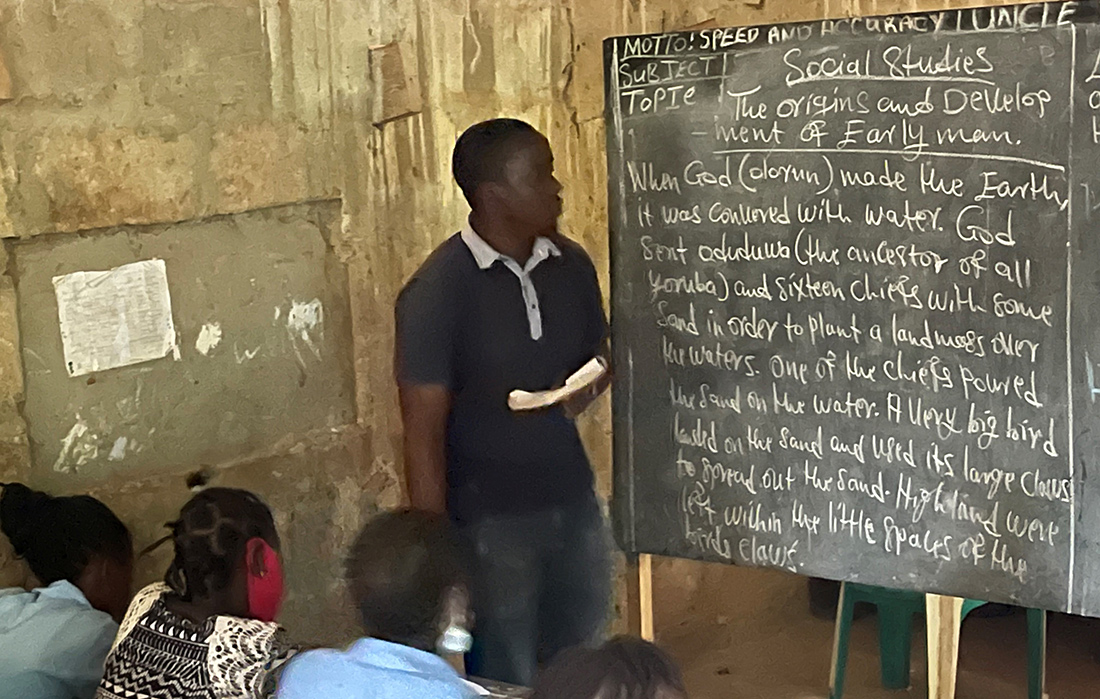7 Churches; 500 Congregants; 0 Pastors
Problems and Potential in Sierra Leone

On the western shore of the African continent, the far edge of a region shot through with a brutal history and breathtaking beauty, sits a tiny country by the sea—Sierra Leone. Here, in a land where followers of Christ are few and far between, their numbers dwarfed by Muslims and animist practitioners, a network of Presbyterian churches shines like a beacon of hope.
There are seven churches in all, boasting hundreds of members both in the capital city and in rural areas. Several of these double as community schools—simultaneously helping sustain themselves financially, serving their neighbors’ tangible needs, and functioning as a platform for outreach and ministry. They’ve got good leaders, many committed to solid Reformed theology, a firm foundation of loyal tithers that help sustain the churches, a vision for church planting, and even plans to start various income-generating business enterprises to ensure the churches can sustain growth and pay their leaders.
All told, it sounds like a dream scenario. But there’s just one problem. The Presbyterian Church of Sierra Leone has no pastors.
Beginnings and Endings
It wasn’t always this way. Nearly 30 years ago, the churches were started by a group of Korean Presbyterian missionaries.
“There are actually a lot of Korean fishermen on the west coast of Africa,” explained current MTW West Africa Area Director Frank Sindler. “The Korean missionaries originally came in to plant a church among these fishermen, but it didn’t go well. So they started working with Sierra Leonean children.”
Before long, the missionaries’ children’s ministry had grown to include the kids’ parents, and then their neighborhoods. Soon, their ministries were thriving and growing throughout the country. The seven churches still existing today were planted, each with an ordained pastor. Things were good.
Then civil war broke out, and everything changed.
“It was pretty bad,” said Frank. “My family and I were living in Senegal at the time, and I remember there were lots of refugees pouring out of Sierra Leone; a lot of violence.”
Deterred by the conflict, the original missionaries left, and the churches they had started had to fend for themselves, and without a system in place to train or ordain new leaders. Then, one after another, the churches’ pastors and elders left as well. Some moved to other African countries to do ministry or start a new life; one now pastors a church in Florida. Still others died in the conflict or during one of the several deadly Ebola outbreaks that came in war’s wake.
Today, not a single teaching elder is left, and Sierra Leone remains a difficult place to live or do ministry. Without trained pastors, other doctrines have also crept in and begun to take hold in the churches. Years of civil war decimated the population and economy alike, leaving behind both psychological scars and crippling poverty. Even in the city, resources are often scarce, disease rife, and medical facilities few and far between.
Potential
Still, despite the challenges, 500 faithful Presbyterians worship in Sierra Leone. The remaining ruling elders and a cohort of long-time pastoral interns hold the churches together, keeping them not only surviving, but thriving. In the urban congregations, many church members have college degrees, are business owners, or work for the government. Meanwhile, former congregants now living elsewhere send funds back home to continue supporting their mother churches. They have numbers, resources, education, and drive.
“It’s very different than what we’re used to,” said Frank. “What we’re usually working with in West Africa is first generation believers who are rural subsistence farmers.”
In other words, while the country itself is a mess, the congregations are some of the strongest Frank has seen or worked with in all of West Africa, with enormous potential for even more growth and impact—if only they could get their leaders properly trained and ordained.
One of these local leaders is a man known as “Lulu.” Though Lulu has functionally served as a pastor at one of the Sierra Leonean churches since 2010, he has technically been an intern the whole time—all because there is no one to ordain him.
“Lulu is persistent,” said Bert Williams, an MTW missionary in Uganda. “He’s keen on working in the church and building it up. … He won’t give up.
A New Hope
Nearly 10 years ago, several of the churches’ ruling elders reached out to MTW, prompting MTW missionaries Jason Polk (Ethiopia) and Bert Williams to visit. There, local Christian leaders took the dynamic duo on a tour of the country—talking to Presbyterian church leaders by day and leading evangelism crusades by night. The trip was a fact-finding mission, enabling MTW to meet the local leadership and identify the churches’ strengths, weaknesses, and needs. The pair left sobered by the challenges, but even more excited for the kingdom possibilities.
“They had a real heart for evangelism,” Bert said. “They’re very Presbyterian and they love Jesus—that’s a good combination.”
For years, driven by necessity, strategic priorities, and a lack of resources, MTW’s Africa teams were forced to leave Sierra Leone on the backburner. Now, following a strategic realignment, the Presbyterian Church in Sierra Leone is once again front and center. MTW missionaries in West Africa are already beginning a Reformed theology certificate program with Lulu and several other local Christian leaders. Bit by bit, these trainings will equip these men with the education they need to become ordained and lead their churches as full teaching elders. They have also connected the church in Sierra Leone to the more developed Presbyterian denomination in nearby Gambia. As a result, the Sierra Leonean churches have adopted the Gambian denomination’s book of church order and is sending their budding leaders through Gambian-led trainings.

Things are looking up, but the Sierra Leonean churches’ needs are still enormous. What they need now—according to MTW’s veteran missionaries to Africa—is an experienced interim pastor to dedicate a year or two to serving, building up, and empowering the Presbyterian Church of Sierra Leone, paving the way for up-and-coming leaders and laying the foundation for a self-sustainable denomination.
“It would take somebody humble; somebody who is able to not be in charge,” Bert laughed. “We Americans like to be in charge, but these guys have so much going for them. They just need somebody to fill in some gaps and speak into their lives, to take these men from being interns to being actually ordained.”
Any way you look at it, Sierra Leone is a difficult field. But here, amid the poverty and scars of war, a scrappy group of Presbyterian churches are yearning to grow, thrive, and impact their country with the gospel. MTW wants to give them the tools to do so, and we’re excited to see what God will do next.
If you’re an experienced pastor with a sense of adventure and a heart for the global Church, we’d love to talk with you about serving as an interim pastor in Sierra Leone. This is a rarity—a short term (1-2 years) need, with an outsized potential impact. All the puzzle pieces are in place. Sierra Leone’s Presbyterian Church just needs someone to come help put them in the right order. Start the conversation at mtw.org/go.
